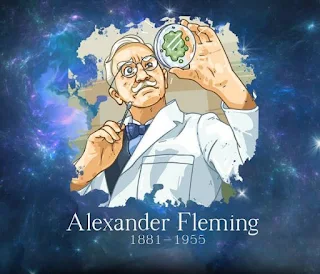Alexander Fleming, the inventor of penicillin, was born in 1881 in Lochfield, Scotland. After graduating from the medical school of St.'s Hospital Mary in London, Fleming has been involved in immunity investigation.
Later, as an army doctor in World War 1, he studied infection in wounds and he found that many antiseptics damage the body's cells more than they damage germs. Fleming realized that what was needed was something other than killing bacteria but not damaging and harmful to the cells of the human body.
After the war, Fleming returned to the St. Petersburg hospital. Mary. In 1922, while investigating there he discovered something he called lysozyme. Lysozyme is produced by the human body, consisting of components consisting of both mucus and teardrop which are harmless to the cells of the human body.
These components will paralyze certain germs, but unfortunately, it is not effective against specific germs that are harmful to humans. The findings, however interesting they may be, are of no great significance.
It wasn't until 1928 that Fleming managed to find something meaningful. His laboratory cultivates the "staphylococcus" bacteria, which is left open in the air and becomes dirty and rotten. Fleming found that in the culture around the decay, the bacteria become liquid.
He quickly concluded that the putrefaction had produced a substance that was toxic to the "staphylococcus" bacteria. Soon he was able to show that similar substances were present in the growth of various harmful bacteria.
The substance - which is named penicillin after the occurrence of putrefaction (Penicillium notatum) - is not a liquid for either humans or animals.
Fleming's findings were broadcast in 1929, but they did not attract much attention at first. Fleming argued that penicillin was important for treatment. However, he was unable to develop a technique for purifying penicillin, and for more than ten years the essential medicine remained in limbo.
Finally, at the end of the 1930s, two British medical investigators, Howard Walter Florey and Ernst Boris Chain discovered Fleming's writings. They reviewed Fleming's work and perfected and made clear the results.
They then purified the penicillin, tested the substance in laboratory animals. In 1941 they tried penicillin on humans who were sick. Their experiments proved that this new drug had amazing potential.
With the encouragement of the British and American governments, pharmaceutical factories are now starting to get involved and quickly develop methods of producing penicillin in large quantities. Initially, penicillin was only provided for the use of war victims, but in 1944 it could be used by civil society in Britain and America.
By the time the war ended in 1945, the use of penicillin had spread throughout the world.
The discovery of penicillin has greatly stimulated the investigation of other antibiotic fields, and subsequent investigations have yielded various "miracle drugs". However, penicillin remains the most widely used antibiotic.
One reason that makes its lasting advantage is: penicillin is effective against various kinds of harmful micro-organisms. This drug is useful for treating syphilis, gonorrhea, diphtheria, as well as various kinds of arthritis, bronchitis, scarlet, liver, gangrene, and many more.
Another advantage of penicillin is that it is relatively safe to use. A dose of 50,000 units of penicillin is effective against various infections. And injecting 100 million units of penicillin a day does not affect. Although a small proportion of people are allergic to penicillin, for most people it is a drug that can mature and protect it.
Since penicillins have saved millions of people's lives and are sure to save many more in the future, very few people have a different understanding of what Fleming's invention of penicillin means.
His exact place in this ordered list depends, of course, on the extent to which people give meaning to the roles that Florey and Chain have assigned. I think, in part, the main merit and role lie with Fleming, who made this essential discovery.
Without Fleming, it would take people years to find penicillin. As soon as he announces the results of his invention, sooner or later there will be improvements and produce it more cleanly.
Fleming marries and lives happily with the gift of one child. In 1945 he won the Nobel Prize for his discovery services and distributed the prize to Florey and Chain. He closed his eyes in 1955.

